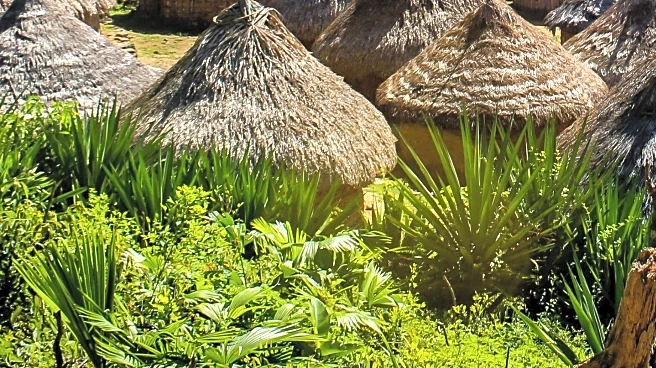What's Happening?
A project in Tzurumútaro, Michoacán, Mexico, funded by Slow Food and IFAD, is focusing on the cultivation of medicinal gardens to support indigenous communities and restore ecosystems. María Guadalupe
García Alonso, a specialist in sustainable development, is leading the initiative to recover and cultivate backyard gardens of medicinal plants. These gardens serve both family use and small-scale commercialization, preserving traditional knowledge and practices. The initiative is part of the Slow Food Indigenous Peoples’ Network, which aims to safeguard the rights and traditions of indigenous communities, recognizing their role as guardians of biodiversity. The project highlights the importance of medicinal plants in traditional Purépecha medicine, which is a holistic system focusing on cultural illnesses and overall harmony.
Why It's Important?
The initiative is crucial for preserving the cultural and food biodiversity of indigenous communities, which face threats from foreign capital and monoculture practices. The influx of large-scale agriculture, particularly berries and maize for export, has disrupted traditional subsistence systems, leading to a crisis in food and cultural autonomy. This shift has resulted in reduced cultivation of traditional foods and medicinal plants, jeopardizing food security and traditional medicine heritage. Additionally, the environmental impact of monoculture and pesticide use threatens the ecological balance of the Pátzcuaro basin. The project aims to counter these effects by promoting traditional practices and supporting community resilience.
What's Next?
The project will continue to focus on expanding the knowledge and cultivation of medicinal plants, creating herbariums, and promoting traditional agricultural practices. Efforts will be made to engage the youth in farming and traditional trades, countering the lure of corporate wages and preventing the abandonment of family agriculture. The initiative seeks to strengthen community cohesion and address social issues such as drug dependencies linked to economic and social upheaval. By reinforcing traditional practices, the project aims to restore cultural identity and environmental health.
Beyond the Headlines
The initiative highlights the broader implications of cultural erosion and economic marginalization faced by indigenous communities worldwide. It underscores the importance of traditional knowledge in maintaining biodiversity and ecosystem health. The project serves as a model for integrating cultural heritage with sustainable development, offering insights into the challenges and opportunities in preserving indigenous practices in the face of globalization.












